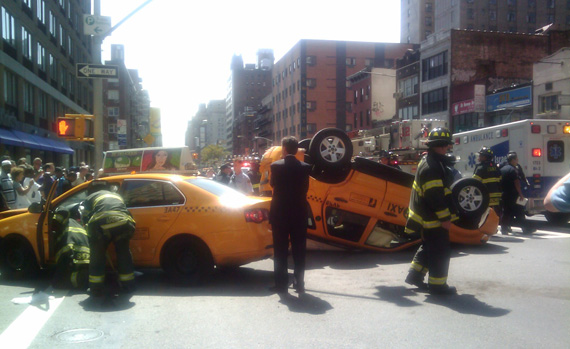
The Taxi and Limousine Commission voted to revise some of its rules Thursday, strengthening safety requirements for drivers of for-hire vehicles as well as yellow and green cabs. But the TLC still does not require aspiring cabbies to pass a New York City road test before obtaining a hack license.
There are 70,000 for-hire drivers currently licensed by the TLC, according to the agency, transporting almost as many passengers per day as yellow cabs. Surprisingly, until now the drivers of for-hire vehicles -- including livery cabs, black cars, and limousines -- didn't have to pass a TLC exam to obtain TLC licenses. The new regulations require a "taxi school equivalent" course for new for-hire applicants and drivers who want to renew their for-hire licenses.
However, some drivers with no TLC-authorized training will still be allowed to drive for-hire vehicles. New drivers may be issued a conditional TLC license and given at least 90 days to complete the training course. Exempt from the training requirement are "New York City police officers and certain persons with military service."
The TLC instituted a new continuing education component for taxi and for-hire drivers. Traditionally, after their first year with a TLC license taxi drivers were required only to take a general defensive driving course every three years. The revised rules require the completion of a TLC-specific "license renewal course" for taxi and for-hire drivers. It's not clear exactly what the course will entail, though a TLC summary of the rule revisions suggests it will cover new TLC regulations and "new street design patterns," in accordance with Mayor de Blasio's Vision Zero program.
For-hire drivers will also receive specialized wheelchair-accessibility training under the new rules.
As Streetsblog reported last December, when the TLC held a hearing on the regulations adopted this week, drivers who want a TLC license must already have a for-hire license from the state DMV. The DMV requires a road test, but it isn't tailored to the crowded street conditions applicants face in New York City.
“There’s several suggestions that have come through the Vision Zero task force as to how to improve the safety components of our curriculum," TLC Commissioner Meera Joshi said last month, "some of which we’re working on, some of which have some practical obstacles, too. It’s something we’re going to look into, but it’s not part of our current curriculum.”
Michael O'Loughlin of Cab Riders United issued a statement following Thursday's TLC hearing:
Those are common sense changes we can all support, but for the initial training and the continuing education courses to make a real difference they need to focus on the most important safety and passenger service content, and the evaluation standards need to be real and rigorous. Many New Yorkers still find it shocking, for example, that there’s no required taxi driver road test or ride-along with an experienced driver to evaluate the candidate’s ability to navigate the city safely. A person could literally have never driven in New York, sit through a few classes (some of them online), fill out some paperwork, and then have their first NYC driving experience piloting 6,000 pounds of steel through congested streets with vulnerable New Yorkers inside and outside the cab for up to 12 exhausting hours per shift.





